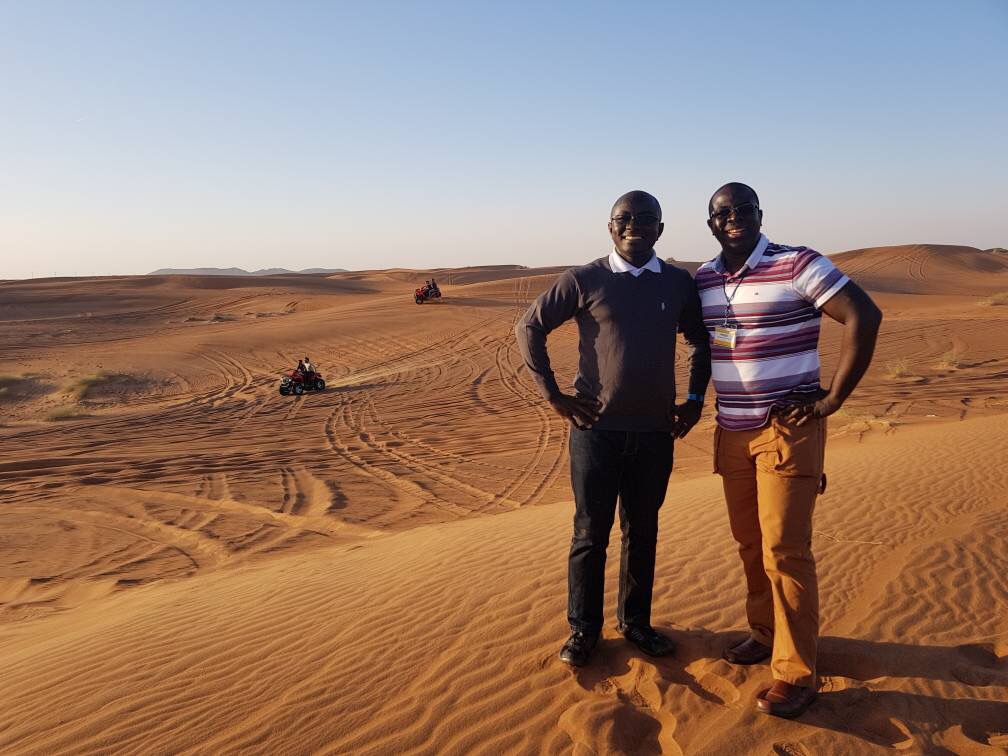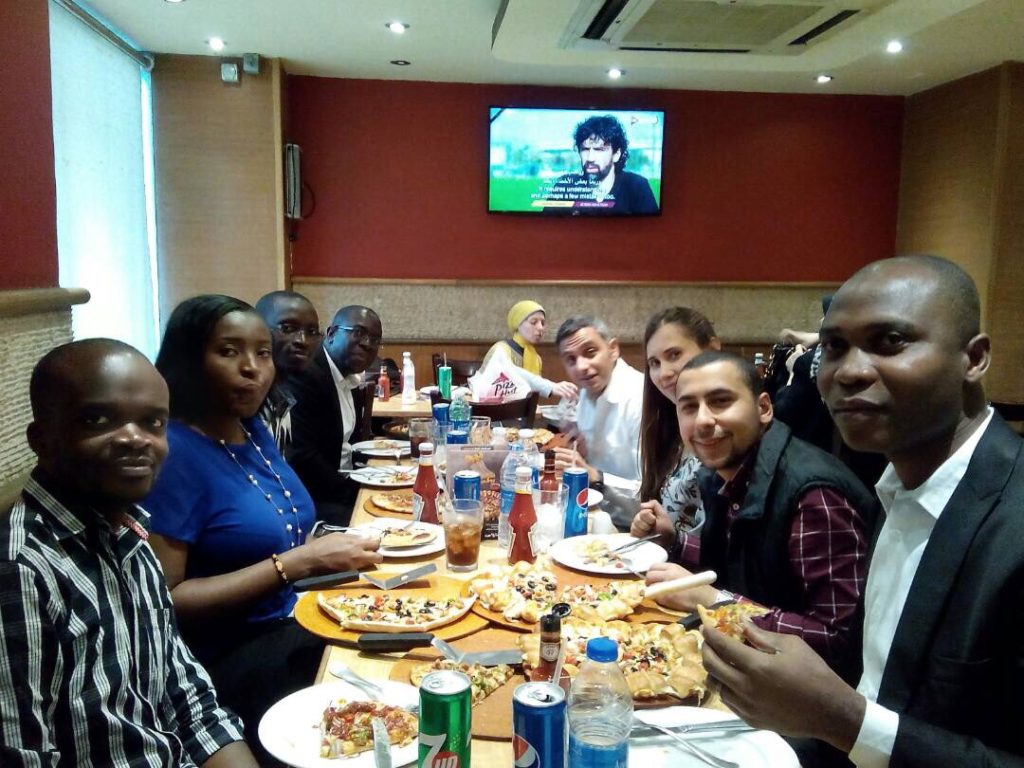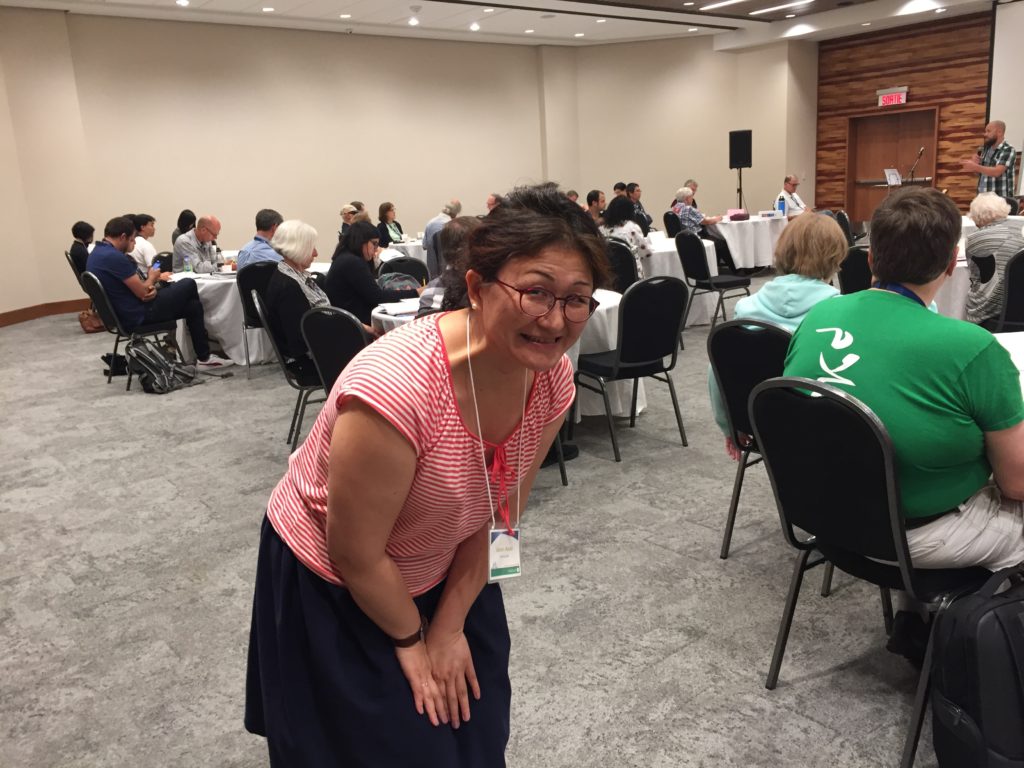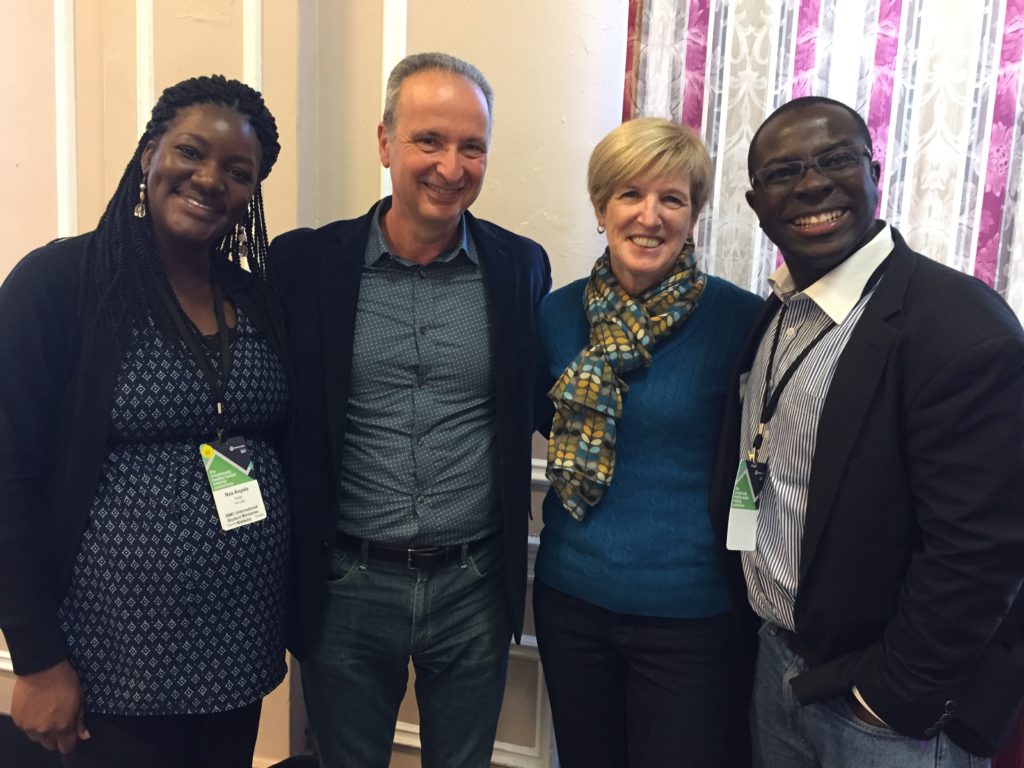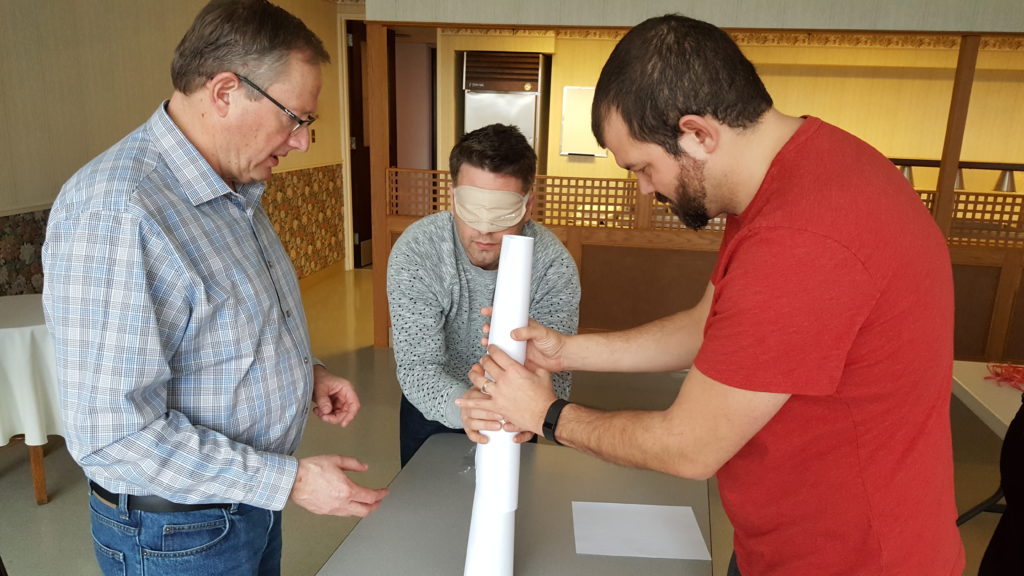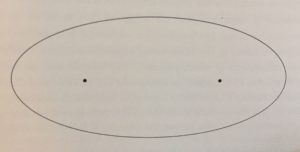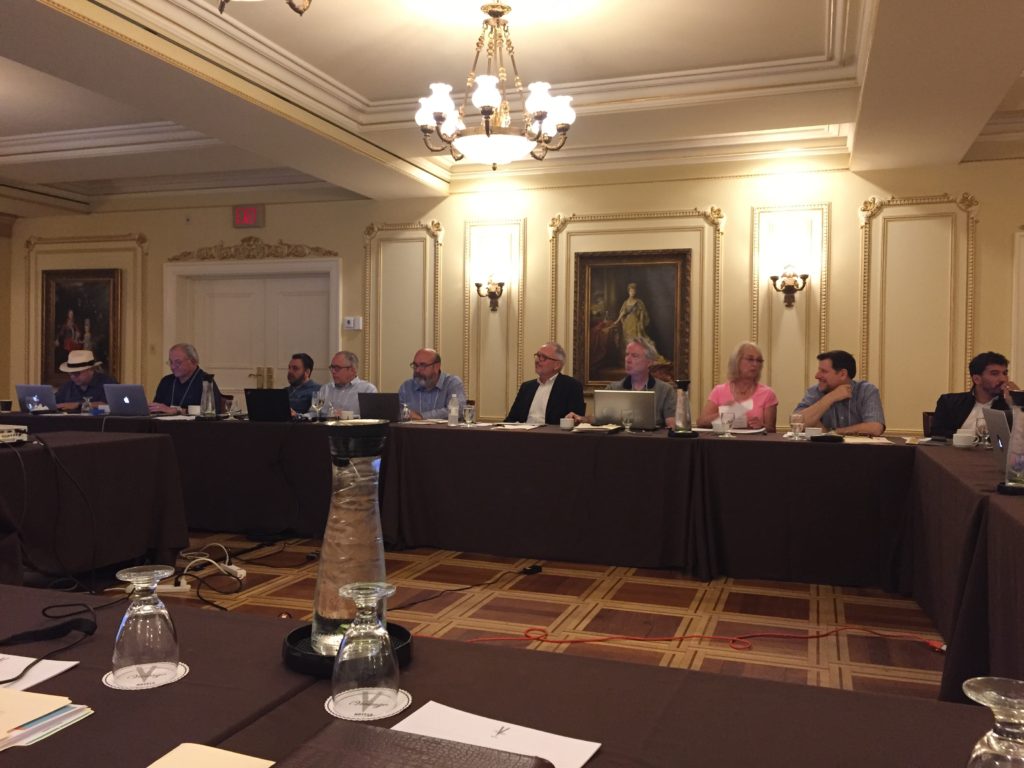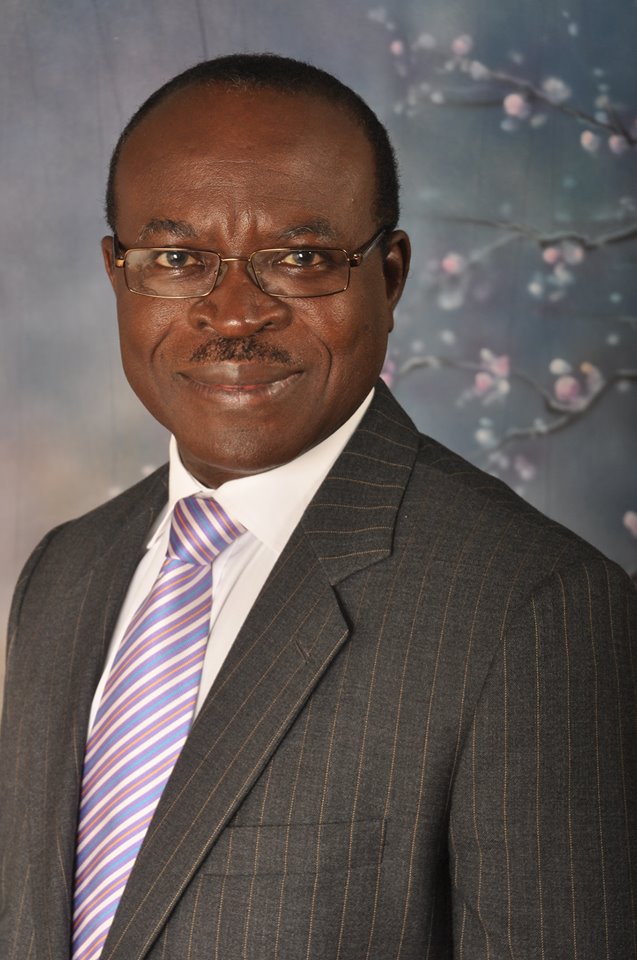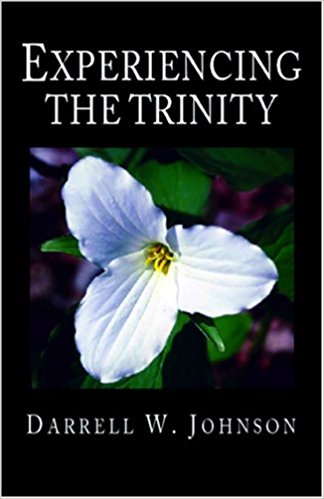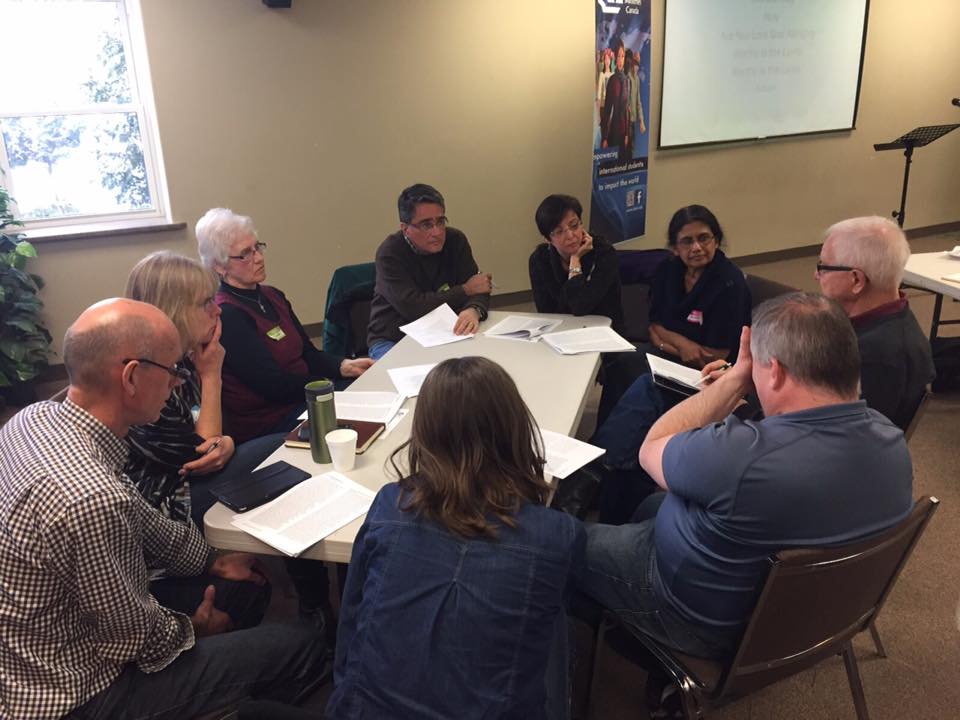Caught in a Cross-Fire of Love
I seldom share my personal written prayers in public. But as the LORD mercifully answers this one may it be your reality too.
Dear Love,
So where did I get the idea that I am somehow an originator of love when you are not only the pioneer, picture and perfector of love, you are Love itself; or rather should I say, Himself?
Today, I am happy to be caught in the cross-fire of the “love that flows between the Father and Son, enfolded in [your love], sharing [your] passionate love for the world” (Seamands 2005, 53). As I read about Jack frost (53-56) I wondered if the author had heard about me and retold my personal story with that pseudonym. You know I am a recovering workaholic, performance-driven, results-oriented, doing-more-than-being hard taskmaster, but you have been transforming me by the renewing of my mind since I began Fuller over a year ago. Thank you.
And now if indeed Jesus is sending me as you sent him (John 20:21), o then may I feel afresh “the profound awareness of the Father’s affectionate love [as] the foundation of [my] ministry” too (63). May my sending (achievement) be out of a sense of being (acceptance), well-being (sustenance) and being-ness (status) (63-64).
O how I often slip away from this foundation and time and again become a ‘loving worker’ instead of a ‘working lover’ (65). May I truly profoundly and experientially know your heart for me before having your heart for the nations (66-67).
What a stark reminder, dear Lover and Lord, that who I am is more important than what I do not just because the latter flows from the former but that my identity as a son is proto, prime and permanent. If even I did nothing, I will always still be your beloved son in whom you are well-pleased. Profound. Wow!
May you remove every known and unknown barrier to your love for me, may I feel your passionate phileo and even eros love for me—not just agape. I want to feel the fire of your love afresh in my soul.
So! back to the beginning. I am happy to be caught in the cross-fire of that divine love which “is a burning fire; in all its intensity and infinity…has but one object and but one joy, and that is the only-begotten Son” (72).
Thank you for including me in “the circle of that fiery love” (73). May I always be content to stay there—to just be.
Your co-lover and co-loved,
Yaw
Work cited
Seamands, Stephen. 2005. Ministry in the Image of God: The Trinitarian Shape of Christian Service. Downers Grove, IL: InterVarsity Press.
You don’t know You if you don’t know God—and vice versa.
With all due respect, we are fooling ourselves if we think we can know ourselves without knowing God or know God without knowing ourselves. You can’t have one without the other. Here’s why.
“MAN, KNOW THYSELF”
We shall not even begin to delve into the convoluted Egyptian and Greek history that tries to explain the origins of the poignant phrase, “know thyself.” Suffice it to say that in leader development, many practitioners like me are in a hurry to get to exciting things like vision and mission and to teach skills like communication, team-building etc. but when we skip the essential task of helping people to first discover more of themselves, pay attention to themselves, there is imminent danger on an already treacherous leadership journey. “Man, know thyself,” said Socrates and apparently many other ancient Greek sages.
There are many reasons why self-awareness is important, like discovering the strengths and weaknesses of one’s personality (DISC, Enneagram or Myers Briggs as examples), uncovering how one’s ancestry affects their present attitudes, emotions and actions (using a genogram, for example), unveiling blind spots, discovering one’s giftedness (eg. using a StrengthsFinder assessment), exploring one’s cultural values (basic values survey) etc.
All that being said, it may astound you how knowing ourselves and knowing God are inextricably linked.
SIAMESE TWINS
I don’t know if using conjoint twins is the best analogy for illustrating this but Scripture, church history, current research and umpteen experiential anecdotes have proven beyond doubt that “a heart to know God more intimately requires an openness to discover oneself more truthfully” (Reese 2012, 57) and vice versa; also, that “true knowledge in the life of faith is always a “double knowledge.” We cannot know ourselves without knowing God or know God without knowing ourselves.
ANCIENT WORDS
Just check out what a few significant voices from the past have said about this double knowledge for nearly 2,000 years:
- Augustine (354-430): “Grant, Lord that I may know myself that I may know thee.”
- Bernard of Clairvaux (1090-1153): “Know yourself and you will have a wholesome fear of God. Know God and you will also love God. You must avoid both types of ignorance, because without fear and love, salvation is not possible. Without knowledge of self, we have no knowledge of God.”
- Julian of Norwich (c. 1342-c. 1416): “For our soul is so deeply grounded in God and so endlessly treasured that we cannot come to knowledge of it, until we first have knowledge of God, who is the Creator to whom it is united. …And all of this notwithstanding, we can never come to the full knowledge of God until we first clearly know our own soul.”
- Thomas à Kempis (c. 1380-1471): “a humble self-knowledge is a surer way to God than a search after deep learning.”
- John Calvin (1509-1564): “Our wisdom, in so far as it ought to be deemed true and solid wisdom, consists almost entirely of two parts: the knowledge of God and the knowledge of ourselves… The knowledge of God and the knowledge of ourselves are bound together by a mutual tie.”
- Blaise Pascal (1623-1622): “To know God and yet know nothing of our own wretched state breeds pride; to realize our misery and know nothing of God is mere despair; but if we come to the knowledge of Jesus Christ we find our true equilibrium, for there we find both human misery and God.”
PAY DOUBLE
No wonder the apostle Paul said to his mentee “pay close attention to yourself.” Of late I have staged a ‘rebellion’ against corporate leadership and the self-help/motivational industry because of the wanton decoupling of ‘religious life’ from reality. My frustration with church leadership also is when “these answers we know from Scripture” and “the questions we have in our life” are not really matching up well (Reese 2012, 60) and all this theology doesn’t seem to go anywhere or land in reality.
The most liberating thing for me in the final chapter of David G. Benner’s The Gift of Being Yourself is that “genuine Christ-following will always make us more, not less, human” (88). And I adore the Lord Jesus Christ for showing me the way: “By becoming fully human, Jesus leads us to the fulfillment of our humanity. By being fully God, he leads us to God” (88). Hallelujah!
As Benner puts it, “The anthropological question (Who am I?) and the theological question (Who is God?) are fundamentally inseparable” (83). I have become very, very, very, very wary of a multi-billion dollar self-help/motivational industry that has no place for God. Very. Or a musty theology that is not grounded in the reality of being human. Double knowledge, my friends. We’ve got to pay attention, twice.
Works Cited
Reese, Randy D., and Robert Loane. 2012. Deep Mentoring: Guiding Others on Their Leadership Journey. Downers Grove, IL: InterVarsity Press.
Benner David G. 2015. The Gift of Being Yourself. Downers Grove, IL: InterVarsity Press.
A Daniel Dare for the New Year
With another new year comes another fresh challenge of fasting and prayer for 21 days—just like Daniel did.
HARD TO BEAT
Make no mistake. Every excuse you may have not to fast and pray, Daniel had same and more. He was super smart, highly intellectual and well-trained—from Alchemy to Zoology (Daniel 1). He aced the national test to serve the king.
He was super gifted with insight to interpret dreams, mysteries and hard puzzles that baffled the most sophisticated magicians, enchanters, astrologers and diviners of his time—in fact, he was once appointed chief of them all in King Nebuchadnezzar’s era (Daniel 5).
Daniel was super busy—he was one of three senior ministers overseeing 120 regional ministers of the Babylonian kingdom—he wasn’t slack. Indeed, Daniel so distinguished himself among the ministers and senior ministers by his exceptional qualities that the king planned to set him over the entire kingdom as prime minister (Daniel 6).
He was super principled and ethical—his diet, motives, honesty, disciplines, integrity, convictions… He was a man of noble character. He served several successive kings—he outlasted them—even as an immigrant in high political office.
Super young, super good-looking, super liked and all the above, he still found the need to fast for 21 days, seeking understanding of an issue that he wanted to unravel. At that time I, Daniel, mourned for three weeks. I ate no choice food; no meat or wine touched my lips; and I used no lotions at all until the three weeks were over. (Daniel 10:2-3)
If you are satisfied with being super by earthly standards, then by all means forget about the pain of fasting and the work of prayer. But if you want to see the supernatural intervening in your earthly matters, then welcome to the school of fasting and prayer.
DO THE MATH
Every new year is a mystery, like Daniel’s, waiting to be unravelled. To take 21 days seeking audience with the Author, Executor and Perfector of all the 365 days laden with prospects and dangers is only a 6% investment of your year but worth 100% of the effort.
Since 2007 a number of us have done this math and figured an exciting time of seeking the Lord in 21 Fasting Days of Prayer, Purpose and Planning at the start of each year is so worth it. See my blog last year for some of the most important reasons why I personally do this year after year for over 10 years now!
Please plan to join us as we seek the Lord in fasting and prayer from January 2nd to 22nd. We will plan to meet together daily for corporate prayer times in person or via video call (Zoom) from 5 pm to 6 pm local time (wherever you are in the world) and 5pm to 6pm ET in North America in particular. You will find the meeting link and schedule of daily prayer topics below.
CHOOSE YOUR FAST
In fasting, we commit to denying ourselves of food, drink or other comforts to more fully focus on prayer and fellowship with God. There are many types of fasts. There are complete fasts where you deny yourself all food or partial fasts where you forego certain types of food. Food is anything with calories 🙂 so does not include water (which has zero calories). It is actually a healthy practice to keep hydrated since the body is 60% water. A dry fast (no water) isn’t recommended beyond three days. Usually, when people set out to fast for an extended time—like the 21 days in the Daniel Fast—they will choose to do a partial fast.
The Daniel diet during this fast (like he did) is mainly vegetables and denying yourself meat, drinks and other choice foods. Basically, nothing fancy. Some still have three meals a day but nothing fancy (as described above) while others go the whole day denying themselves breakfast and lunch and eating only in the evenings.
Here are three suggestions of different partial fasts you could choose this January:
1) Full day fast Type 1: Fast from breakfast and lunch and eat a normal supper in the evening for the 21 days.
2) Full day fast Type 2: Fast from breakfast and lunch and eat a Daniel fast supper in the evening for the 21 days.
3) Fast Type 3: Eat three Daniel Fast meals each day for 21 days.
Please prayerfully consider joining us for this exciting 21 fasting days of Prayer, Purpose and Planning for 2018!
LAND THE DEAL
“Do not be afraid…Since the first day that you set your mind to gain understanding and to humble yourself before your God, your words were heard, and I have come in response to them. But the prince of the Persian kingdom resisted me twenty-one days…Now I have come to explain to you what will happen to your people in the future, for the vision concerns a time yet to come.” (Daniel 10:12-14)
It is the same dude, Daniel, who was unequivocal in stating, “…the people who do know their God shall be strong, and do exploits” (Daniel 11:32b). Now you know. HAPPY NEW YEAR!
TECHNICAL INFO
Schedule: January 2-22 daily topics here
Zoom Link: Join from PC, Mac, Linux, iOS or Android
Or Telephone: US: +1 646 876 9923 or +1 669 900 6833 (Meeting ID: 248 246 747)
International numbers available: https://zoom.us/zoomconference?m=BWpwOmbBqIO9McEisO8aYDJSSz5Wzav_
CONFESSIONS OF THE CALLED (#5): Convocation at the Table of Vocation
To be a stable entity one needs to get rid of a one-track mind that calling is just one thing and embrace at least four kinds of vocations, just like the legs of a four-legged table.
It was not until my university days that I clearly heard and understood that I had a unique and specific God-given calling in this life. The excitement of that threw me into an extreme mode where I sought that one and only specific vocation my Creator had for my life. If you’ve been following this Confessions of the Called series, you will know that a lot of my one-track perspective has changed. I now see at least four kinds of callings each of us have, and like the legs of a four-legged table, you just might topple without any of the legs:
1. Human calling.
Our first call is to be human beings (Benner 2015, 87). Personally, I find that I have been so much in a hurry to live out the next call below, the Christian call, that many times I have neither accepted my own humanity let alone that of another. I’m often in a hurry to deal with myself and people as Christian/non-Christian than first of all, as simply human. This is where you can love someone, even an enemy, simply because they too are human—made in God’s image.
2. Primary/General calling.
You may call this the Christian calling. This is basically the primary vocation of having been called by God himself in love to love God and love our neighbour as Christ-followers. The first few blogs in this ‘Confessions of the Called’ series have all been about how foundational and essential this is, before we attempt our secondary call.
3. Secondary/Specific calling.
Based on how God has uniquely wired us with gifts, passions, capacities, experiences, circumstances etc. we can discern through observation, prayer and counsel what specific vocation we may have, since no one else on the planet has our unique fingerprint.
Let me say here, another confession, that unlike the one-track-purpose-for-life that I used to think everyone had, there may be some of us who are called to a patchwork of callings. Perhaps no one captures it better than this English professor at Calvin College, Debra Rienstra (2005, 221-22):
“Some people’s passions are obvious, and God leads them through those passions into a single path of service. Mother Teresa, for example, or the lifelong kindergarten teacher, or the musician who offers his skillful playing every day for God’s glory and other people’s joy. Others, like me, have less obvious passions: what gives the energy develops over time or remains partially hidden or blooms suddenly in response to new situations. As a result such people offer an assortment of odds and ends as service: a regular job done with integrity, some volunteer work, a career decision that seeks service over money and prestige, kindness to neighbors, maybe a late-life passion for going on mission trips or teaching teenagers appliance repair. Their lives may not have the clean simplicity of vocation, but at the center of everything they do is a deep love for God—and that is everyone’s true vocation.
“I’ve learned that God treasures the lives made of a single piece of cloth, cut in the shape of service. But God also values the lives that look more like a bag of fabric scraps, some big pieces, some tiny pieces, different colors and weaves. At each stage in my life, with each piece of it, I try to ask God, “How can I offer this to you?” I have to trust that if I offer all the odds and ends of my life, God will stitch together the pieces in some lovely pattern and receive it as my gift.”
4. Immediate calling
This last one I gleaned from Gordon T. Smith’s Courage and Calling: Embracing Your God-given Potential. It brought such a sense of peace to me as I tend to be very futuristic and ‘big dreamy’ in my approach to life thus find little, urgent things like changing a diaper or taking my wife grocery shopping quite interrupting and irritating. Immediate calling means God invites us to be responsible with the present demands and tasks of our lives (Smith 1999, 10).
“And we know that God causes everything to work together for the good of those who love God and are called according to his purpose for them”—human, primary, specific, immediate callings. So come to the table just as you are, right where you are, right now. Relax. God’s got this.
Works Cited
Benner, David G. 2015. The Gift of Being Yourself: The Sacred Call to Self-Discovery. Downer’s Grove, IL: InterVarsity Press.
Rienstra, Debra. 2005. So Much More: An Invitation to Christian Spirituality. San Francisco, CA: Jossey-Bass.
Smith, Gordon T. 1999. Courage and Calling: Embracing Your God-Given Potential. Downer’s Grove, IL: InterVarsity Press.
What’s in a name?
Sometimes one can’t help but wonder whether names of people in history were given to them after they lived the way they did (to capture the essence of their lives) or really before. Naming is important; names are prophetic.
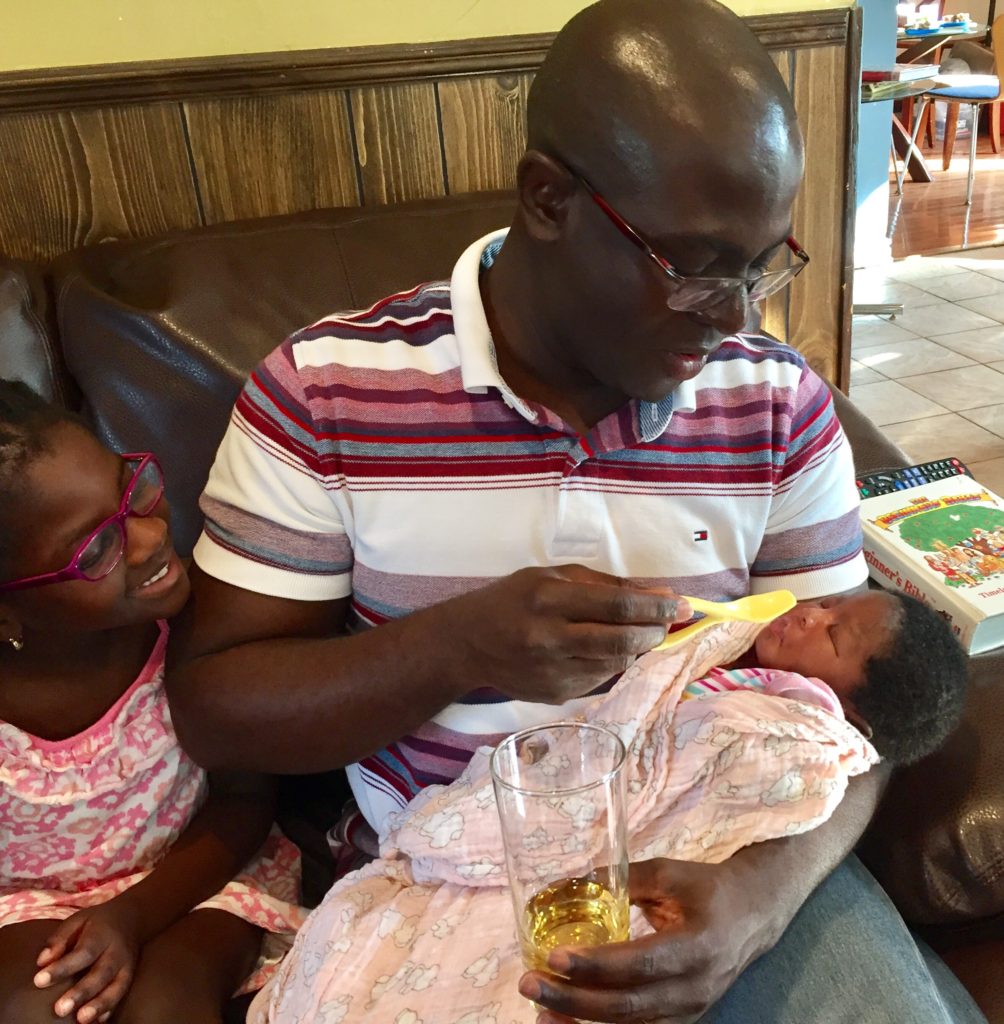
Performing an Akan tradition where you symbolically ask the child to learn to distinguish between ‘water’ and ‘juice,’ ‘good and evil,’ ‘black and white,’ right and wrong.’
Nana Ahomka
Nana Ahomka Asamoabea Perbi
And a voice came from heaven: “You are my Son, whom I love; with you I am well pleased.” (Mark 1:11)
And Jesus grew in wisdom and stature, and in favour with God and man. (Luke 2:52)
 I woke up early morning on Monday, 6th February with ‘Adenyinaamu’ on his heart; yes, that this child we were carrying will be holistic and have “God in my everything,” “God over everything.”
I woke up early morning on Monday, 6th February with ‘Adenyinaamu’ on his heart; yes, that this child we were carrying will be holistic and have “God in my everything,” “God over everything.”
Considering the challenge of name pronunciation in the global context we kept the idea of holistic, wholesome, bringing God pleasure in every area of her life and gave her the simpler version Ahomka, Nana Ahomka–God’s pleasure (delight). This emphasizes both our prayer that she will live a wholesome, holistic life, all aspects pleasing to the LORD, as well as that she will bring delight to us and everyone she ever encounters.
The middle name, Asamoabea, is that of my beloved paternal grandmother who was quite the prayer warrior and story-teller! And boy could she dance with delight to everyone’s delight!
Our prayer:
Let love and faithfulness never leave you; bind them around your neck, write them on the tablet of your heart. So you will find favour and good repute In the sight of God and man. Trust in the LORD with all your heart and lean not on your own understanding; in all your ways submit to him, and he will make your paths straight. (Proverbs 3:3-6)
From ‘Fantastic Four’ to ‘Fabulous Five’

Our children with their prophetic names (from left to right)…
- Nana Agyina (God’s Purpose) | Boy, 9 years
- Nana Adwenepa (God’s Paradigms) | Boy, 5 years
- Nana Ahotew (God’s Purity) | Girl, 2 years
- Nana Ashede (God’s Principles) | Girl, 7 years
- Nana Ahomka (God’s Pleasure) | Girl, 0 years (or 1 year, the Chinese way 🙂
Emotionally Constipated
In medical school this wasn’t one of the diagnoses I was taught I could make but on the other side of the doctor’s desk, this may be an even more dire diagnosis than a clogged gut.
MAINLY MEN; BUT NOT ONLY
Last Sunday, in a suburban church in Montreal, this was the summary of the middle-aged chap who shared his life-long struggle of dealing with his past: “I don’t do emotions.” Me too! Well, no more.
In many world cultures, that is the manly thing to do; it is macho. Some women try it too 🙂 In fact, in my own language, there is a saying that, “Obarima nnsu;” to wit, real men don’t cry. Even as a little boy growing up in Scripture Union circles in Accra, I always knew there was something wrong with that statement because I considered no one more manly that Jesus Christ yet he wept. Ever since then, I haven’t had a problem with weeping (you probably have seen me weep!) but errm… not done so well with a whole range of other emotions.
FACE, FIGHT OR FLIGHT?
I still remember my rather unemotional response to one of my staff’s emotional appeal when he said, “I feel…” My immediate response was, “Good thing that it’s only a feeling; but what do you think?!…” I don’t need to tell you that conversation didn’t go very well after that.
The Lord has been particularly convicting me of my emotional immaturity since the beginning of this year. Prior to that, I was the kind of leader Ruth Haley Barton would describe in Parker Palmer’s words as having risen to leadership based on “extroversion, which means they have a tendency to ignore what is going on inside themselves. These leaders rise to power by operating very competently and effectively in the external world, sometimes at the cost of internal awareness… but the link between leadership and spirituality calls us to reexamine that denial of the inner life.” (Barton 2012, 44, emphasis mine).
In fact, I might never have picked up a book like Peter Scazzero’s The Emotionally Healthy Leader because hitherto the word ‘emotional(ly)’ anywhere put me off. But for Dallas Willard and Scazzero, I had never thought of my emotional life as specifically needing to be discipled! I certainly did not have the theological, mental or practical framework for that!
Scazzero astounded me and totally destroyed my perception of what spiritual formation consists of when he emphatically stated, “it is not possible to be spiritually mature while remaining emotionally immature!” (Scazzero 2015, 17). Gordon Smith drove the dagger deeper into my heart when he confirmed that “what is happening to us emotionally is not secondary to our spiritual experience, but may actually be—pun intended—the heart of the matter” (Smith 2014, 27).
And whole squadrons of the ancients agree, that “few things are so crucial to our growth in faith, hope and love as our capacity to be alert to the emotional contours of our lives” (28). Smith then adds another dimension, that not only are my emotions an area to be discipled for sure but they are also indicative, a dashboard sign, in the sense that “the depth of our hearts reflects the depth of our emotional lives; nothing so captures the inner recesses of our beings as what is happening to us emotionally” (28). In fact, St. Ingatius exhorts that we check for feelings of consolation and desolation in the Examen.
For all those as emotionally constipated as I used to be, we need to decide now: are we going to face our emotions, fight them or flee?
DENIAL, DISTORTION & DISENGAGEMENT
I could give myriad reasons (in addition to the couple above) why being emotionally aware and emotionally expressive in a healthy way is non-negotiable in life and leadership but just take a moment to consider why Dan Allender and Tremper Longman, in The Cry of the Soul, find this paramount:
“Ignoring our emotions is turning our back on reality; listening to our emotions ushers us into reality. And reality is where we meet God…. Emotions are the language of the soul. They are the cry that gives the heart a voice…. However, we often turn a deaf ear—through emotional denial, distortion, or disengagement. We strain out anything disturbing in order to gain tenuous control of our inner world. We are frightened and ashamed of what leaks into our consciousness. In neglecting our intense emotions, we are false to ourselves and lose a wonderful opportunity to know God. We forget that change comes through brutal honesty and vulnerability before God.”
THE DOCTOR’S DOCTOR
So where do we go from here? Personally, I have not only devoured Scazzero’s The Emotionally Healthy Leader but also led my entire ISMC national leadership team and still taking the fourteen country CEOs of The HuD Group through it chapter by chapter. At ISMC’s recent biennial national staff conference in Montreal, there was a daily ‘Emotionally Healthy’ segment (spirituality, relationship, leadership). In fact, the picture you see above was taken in May 2017, when Anyele and I had the privilege of joining the authors, Peter and Geri Scazzero, at their conference in New York (together with the CEO of The HuD Group Canada and his wife). I’m still learning and eagerly walking with a few others through Emotionally Healthy Spirituality over the next few months.
Having gleaned from Smith that “the genius of good [spiritual] direction is that we probe together, director and directee, and attend to the emotional wake that is left by the myriad of experiences we have had or are having” I have begun a search for a well-fitting spiritual director, apart from the amazing mentors, accountability partners, counselors and coaches I have in my life. And a good practice, encouraged by my wife, has been to “name my feelings,” because “what you name you can tame.”
How about you? Could you too be suffering from emotional constipation? What may God be calling you to do about it? Take a personal Emotional Healthy Spirituality assessment here. Don’t be afraid or ashamed to admit your state of emotional immaturity or bankruptcy, because hey, “God blesses those who are poor and realize their need for him, for the Kingdom of Heaven is theirs.”
Other Works Cited
Barton, Ruth Haley. 2012. Pursuing God’s Will Together. Downers Grove, IL: IVP.
Scazzero, Peter. 2014. Emotionally Healthy Spirituality Day by Day. Grand Rapids, MI: Zondervan.
Scazzero, Peter. 2015. The Emotionally Healthy Leader. Grand Rapids, MI: Zondervan.
Willard, Dallas, 2002. Renovation of the Heart: Putting on the Character of Christ. Colorado Springs, CO: NavPress.
Leadership is Likadis Likadat
The idea of ‘leadership ellipse’ is perhaps the most striking leadership concept I’ve come across most recently. How in the world is one supposed to ‘balance’ the inner spiritual life and the outer demands of leadership and tame tensions like being in the world but not of it, faithfulness and fruitfulness, impact and profit, being and doing… and remain sane?!
LIKAWHAT?
So after paying lots of money to take a course in Mentoring these were among the final words of admonishing (from Dietrich Bonheoffer): “Let him who cannot be alone beware of community” and “Let him who is not in community beware of being alone.” Huh? Now, which is which? Give me back my money! LOL!
Welcome to the business of life and leadership–paradox and ambiguity. To live in one extreme or the other is the easy option (any ‘fool’ can, excuse me to say); but to be able to hold two extremes in balance in your head, heart and in life is the real deal and few are able to handle this well. Yet that is an essential ingredient for success. In fact, sometimes these apparently contrasting dimensions of life are not even to be balanced per se but to be continually held in tension. To be comfortable with the uncomfortable tension and do well therein, that is the issue!
Pursuance of a life and leadership of integrity is living as activists and contemplatives, following and leading, managing our outward leadership responsibility and inward spiritual reality as well as having external organizational success principles and internal spiritual disciplines jiving. Robert Fryling, in his insightful work, The Leadership Ellipse, brings these to the fore and challenges leaders to integrate our lives in the sense of one’s outer and inner worlds being one, synchronous. Fryling’s metaphor to describe a life holding these foci and tensions together is the ellipse.
CALL IT WHAT YOU MAY—BUT IT’S THERE!
Why does Fryling use the ellipse (an elongated circle) metaphor and how useful is that in all the cross-cultural contexts in which I serve? I ask because there are too many times when one is caught off guard trying to use a metaphor (like ‘snowball effect’) that does not cross cultures well. I don’t want a situation of trying to relate a concept that I appreciate so well from a Western context but struggle to transmit.
Fryling’s love for, and deep understanding of, geometry led him to employ this amazing metaphor because an ellipse “is defined by two distinctly different focal points that are of equal importance. One point is not inferior to the other, and both are needed if there is to be an ellipse.”
For Fryling, “one focal point is our inner spiritual life, our longings, our affections and our allegiance to God. The other focal point is our outer world and organizational life, what we do and how we do it. Together these focal points define an ellipse that circumscribes our true spiritual leadership. It represents the dynamic tension between our soul and our actions, and gives us a mental image for personal, spiritual and professional integrity in who we are and how we lead.”
While almost every schooled person, irrespective of culture, may ‘get it,’ I’m glad he uses other metaphors which everyone can appreciate, like form and freedom, the fixed bone structure and flexible muscles of the human body plus basic theology of the full humanity and full divinity of Jesus Christ.
PREDICTOR OF LEADERSHIP SUCCESS
This sense of dissonance between a leader’s outer world and inner world is normal. “We live with paradoxes all of the time,” says Fryling; even Jesus the ultimate leader wasn’t spared. His prayer for his followers was “to live in the world without at the same time being of the world.” In many ministries, like mine, there is a constant struggle between being faithful and being fruitful.
Those are leadership ellipses right there when “waiting on God to move or to shift something inside me while at the same time still needing to lead in the public arena” (Ruth Haley Barton). In fact, Barton goes on to mention how “we might notice tension between what the spiritual life requires and what it takes to be (or at least appear!) successful in the current cultural milieu. On our good days, we might experience these tensions as a place of paradox where creative solutions might be found, but on other days they feel like polarities that are impossible to manage.”
In rapid fire, she continues: “…there is real tension between what the human soul needs in order to be truly well and what life in leadership encourages and even requires. There is the tension between being and doing, community and cause, truth-telling and putting the right spin on things. There is the tension between the time it takes to love people and the need for expediency. There is the tension between the need for measurable goals and the difficulty of measuring that which is ultimately immeasurable by anyone but God himself.
“There is the tension between the need for organizational hierarchy with all the power dynamics this creates and the mutuality and interdependence of life in community to which we as Christians are called. There is the tension between knowing how to “work the system” and entering into trustworthy relationships characterized by trust and a commitment to one another’s well-being. There is the tension between the need for an easy discipleship process through which we can efficiently herd lots of people and the patient, plodding and ultimately mysterious nature of the spiritual transformation process. And there is the challenge of knowing how to speak of these things in fruitful ways in the very inside places of power without becoming polarized in our relationships with one another.” Phew!
INTEGRITY AGAIN!
Living in the tension of this and that, yin and yang, and learning to be comfortable in the space and place, while taming the tension has a lot to do with living a life of integrity. Remember, integritas is about being one whole (integers); not fractionated. And it’s hard.
My seminary president put it this way in his book, Called: “Authentic discipleship delivers us from a compartmentalized life. Rather than having a life with segments and partitions—divisions between sacred and secular, personal and public, image and reality—we’re called to one whole and integrated life. It has to be said, of course, that we usually don’t want such a life and prefer the separate compartments. Such divisions provide room for our conflicting and contradictory instincts and desires. This is how we try to manage our several selves. It’s the hedge-your-bets approach to life, highly appealing but ultimately disappointing. It’s like approaching life as a series of snacks rather than committing ourselves to a full meal” (Mark Labberton).
GAME ON
Fryling, Barton, Labberton, Scazzero and others have assured me that the paradoxes and tensions that I sense as a leader are not only real but normal…and can be successfully grappled with. I’m more willing to embrace elliptical leadership. How about you?
After studying several leaders I have come to the conclusion that the degree to which one is able to be comfortable with and live, love and lead well in the tension of this and that, yin and yang, determines their ultimate leadership success or otherwise. From my little experience and research, the best leaders in the world are those who are not only able to get comfortable with being uncomfortable living in such tensions but mastered the art of dexterously handling both well.
As long as we are alive we will live with ambiguity and grapple with paradox. Part of our discipleship—learning to live and lead like Jesus—is to master how he lived his elliptical leadership life as the God-Man, knowing it can be done; and it must be done.
Works Cited
Barton, Ruth Haley. 2008. Strengthening the Soul of your Leadership. Downers Grove, IL: InterVarsity Press.
Fryling, Robert. 2010. The Leadership Ellipse: Shaping How We Lead by Who We Are. Downers Grove, IL: InterVarsity Press.
Labberton, Mark. 2014. Called: the Crises and Promise of Following Jesus Today. Downers Grove, IL: InterVarsity Press.
I DON’T CARE HOW GOOD YOU ARE (#2)~If you’re not a ‘walkie-talkie’
When “what people say, what people do, and what they say they do are entirely different things” (Margaret Mead) we’re in real trouble. On this Father’s Day, I want to honour the one person, of all the leaders I know in this world, who I can vouch for as walks his talk: my own father.
WHO SAID WHAT?
In my head I was debating whether or not to continue this “I Don’t Care How Good You Are” series on character, ethics, morality and integrity when I chanced upon an quote from the newly-launched book of a dear family friend (actually my Dad’s Best Man nearly 40 years ago!): “What a person truly believes isn’t what they think or say, it’s what they do” —Queenie in Lark Rise to Candleford. That was it; that was my confirmation to do this piece. So let’s roll with another in this character series. But this one is very special because it is dedicated to my own biological father.
In many places and pieces of literature, even in Scripture, the life we lead is often referred to as our “walk.” Let’s examine what it means when our talk (what we say we believe in, who say we are or what say we do) doesn’t match our walk.
WHY DAD?
If there ever was a man of integrity I could vouch for it is my father: Reindorf Kofi Baah Perbi. In fact, even way back in the 1980s during his days as Chief Accountant at the then Social Security Bank (now SG-SSB), when his signature was forged and monies stolen it was his integrity that saved him. Everyone vouched for him: “Chief would never do such a thing,” the convincingly told the authorities.
Those were the heady days of revolution and military rule in Ghana so he had even received a pre-judicial slap or two already when he was picked up by soldiers and sent to Gonja Barracks. After several weeks of tribunal hearings (and I remember us going to fetch him from tribunal hearings after we had been picked up from Ridge Church School), eventually, the perpetrators were found, tried and shot via firing squad. It was no joke. One of them, I believe, is still on the run—he must be still running now or dead from running.
When Dad retired as Ghana’s Deputy Senior Partner of KPMG (one of the ‘big four’ accounting firms in the world) in April 2015, it was humbling to hear how many of his accounting, management consulting, and audit colleagues honoured him for this one thing: integrity. I sat at those banquets (yes, there was more than one! Lol!) soliloquizing, “I want that. When all is said and done, that’s the kind of man I want to be!”
LAYING IT DOWN
Contrast Dad with Kenneth Lay, who was the CEO of Enron. He played a leading role in the corruption scandal that led to the downfall of the Enron Corporation. Unfortunately, Lay and Enron have become synonymous with corporate abuse and accounting fraud since the scandal broke in 2001.
In an interview with the indefatigable Larry King of CNN, after pleading not guilty to criminal counts having to do with his leadership at Enron, these were Mr. Lay’s words: “I lived my life in a certain way to make sure that I would never violate any law – certainly not criminal laws – and have always maintained that most important to me was my integrity, my character, and my values.”
Something doesn’t add up here because in 2004, Lay was indicted on 11 counts of securities fraud and related charges. He was found guilty on May 25, 2006, of 10 counts against him which meant he could face anything from 20 to 30 years in jail. However, only three-and-a-half months before sentencing, Kenneth Lay died of a heart attack while vacationing.
Same thing with Bernie Madoff who founded a Wall Street firm in 1960 of which he was chairman until his arrest on December 11, 2008. He would soon plead guilty to 11 felonies, having turned his wealth management business into a massive Ponzi scheme with almost $65 billion of fabricated gains. Yet hear his defense attorney, Daniel Horowitz: “…Bernard (Bernie) Madoff is a longstanding leader in the financial services industry. He will fight to get through this unfortunate set of events. He is a man of integrity.” Madoff is currently serving a life term in a federal prison for his kind of integrity.
STRANGE ANIMAL
Did you not just read Mr. Lay saying integrity was most important to him? In my short life, perhaps there is no word I’ve found more misunderstood and misappropriated than the word, “INTEGRITY.”
Integrity comes from the Latin root integritas, which means entire or whole. It’s the word from which we get “integer” in Mathematics. It may help to remember that integers are positive or negative whole numbers. To have integrity, therefore, means you are whole, you are one: your private and public lives are one; your charisma and character jive; what you say and what you do are in sync.
Extending the Math metaphor, a life of no integrity on the other hand is fractionated—instead of integers, we have fractions. That is when the Yaw you see behind the pulpit is different from the Yaw you see at the pub; and different from the Yaw you experienced on vacation in Panama; who is also very different from the Yaw at home… Sadly, not too long ago even a pastor whose public image did not match who he truly is was exposed on CNN.
THE ONLY TIME I BELIEVE IN ATHEISTS
When it comes to integrity, I dare say that many non-religious people, even atheists, have more integrity than many so-called religious people. This is what I mean. If Steve says, “I lie, I deceive, I steal.” Steve has low morality. When Yaw says, “I abhor lying, I don’t deceive, I never steal,” he has high morality.
BUT, if Yaw goes on lying, deceiving and stealing then Yaw is not a person of integrity. He doesn’t walk his talk. However, if Steve goes ahead to lie, deceive and steal, although he has low morality he actually is a person of integrity (albeit in a very twisted way) because he walks his talk. He said he will do these and he does.
The extent to which your walk and talk jive is the extent to which you are a person of integrity.
WANTED: WALKIE-TALKIES
I’m not perfect; none of us is. Many times I haven’t kept my word—including keeping appointments. It isn’t a perfect world either; stuff happens that alter our good intentions. One thing I do, however, is strive to call or email and apologize profusely, letting the person know I had every intention to keep my word but now very sorry I’m unable. The Psalmist David, takes this even a notch further saying a person of integrity is one who keeps his/her word, even when it hurts.
Integrity doesn’t mean you are perfect; but it sure means that when you ‘mess up’ you quickly and truly ‘fess up’. That is what made God call David, albeit an adulterer and a murder, a man of integrity (Psalm 78:72), even “a man after my own heart.”
I have observed with shock how people say things they don’t mean and mean what they don’t say; and say things they have no intention of ever acting on. Time wouldn’t allow me to go into my private disappointments in the lives of public speakers whose private lives don’t measure up to their public statements or images. And they have no qualms about it. The Lays and Madoffs did not just wake up one day and find themselves in court—a little slip, a little lie, and slowly slowly but surely surely down a slippery slope we go.
It doesn’t matter how good you are at what you do (skill, talent, gifting). If consistently what you say does not match what you do (walk), I shan’t hire you. Or if I do by mistake or because I want to give you a chance, you’re already on the firing line—it’s just a matter of time, if nothing changes. The world has billions of smart phones; what we need now is truly smart people. We need more walkie-talkies—people who walk their talk and talk their walk.
Thanks Dad, for showing me the way. Happy Father’s Day!
Uncommon Sense or Nonsense? This Trinity Thing
On a recent flight from Halifax to Montreal, the Jehovah’s Witness in the seat next to mine couldn’t help but express near disgust at the concept of God as Trinity. “It just doesn’t make sense.” Wherever she is now, I hope she gets to read Johnson’s book. The author is spot on: it is true the Trinity is a mystery but it is not an absurdity!
The following is adapted from a Devotional Reading Report submitted as part of my Master of Arts in Global Leadership (MAGL) program at Fuller Theological Seminary. May this give you a good foretaste of Johnson’s small book with big impact. Grab it!
Johnson, Darrell W. 2002. Experiencing the Trinity. Vancouver, BC: Regent College Publishing.
Chapter One: Finding the Trinity
I began devotionally reading this book sympathizing with Thomas Jefferson as it seemed quite noble to follow the “simple Jesus” too (Johnson 2002, 13-14) until I realized that, like the early Christians who wrestled with this mystery, a true experience of God in his fullness, invariably leads one to the “complex trinity” (14, 32, 54). This made me understand even more deeply not only the title of the book, Experiencing the Trinity (emphasis mine), but also affirmed my conviction that our theologizing must emanate out of our experience, not just high “ivory tower think-tank” (18, 30) or armchair philosophizing.
Prior to reading Johnson, I had neither considered how the worship of Jesus would’ve been idolatry to monotheistic Jews (15, 30, 39) nor taken the time to observe that Jesus commands us to baptize disciples into the name (singular) of the three-fold God (16). How could I possibly not fall in love with the fact that God is one but God is not alone (22)? Profound! Even now I pause to join the heavenly chorus in adoration: Holy, Holy, Holy! (25)
Chapter Two: Understanding the Trinity
Such profundity, that “at the center of the universe is a relationship,” (37) a threefold community for which I was created and redeemed (37) and whose mission I am on—to bring in the rest of the party. Inasmuch as to the mortal mind this relationship may be “a riddle wrapped up inside a puzzle and buried in an enigma” (37) I truly appreciate Johnson not rubbishing the difficulty in trying to comprehend this mystery by affirming that “Yes, thinking about God as Trinity is hard work.” (38) What I found curious was that the early church “did not formulate the doctrine of the Trinity in order to resolve the mystery of God’s self-revelation, but rather to preserve that mystery” (40). O how I pray that my conviction will be as strong as theirs!
While umpteen analogies from nature try to and fail, to varying degrees, to capture the awesomeness of His majestic three-foldness, it is a stark reminder that the Trinity is not a natural phenomenon but supernatural (47). Dr. Roger Nicole’s diagram (41) has been the most helpful illustration that I have ever come across of both what the Trinity is and what it isn’t.
Chapter Three: Joining the Trinity
This chapter got me skipping like a lamb in my spirit, to recognize the most esteemed invitation I’ve ever received in my life: “God draws near to [me] in such a way as to draw [me] to himself within the circle of his knowing himself” (60). Wow! God’s invitation stuns me. First, that such a high and mighty one would open his heart and hands and stoop so low to literally invite me into his inner circle, rendering himself so vulnerable. But then secondly, it shames me to realize how not vulnerable I want to be towards him, let alone others not quite like me!
I love the ‘circle’ metaphor because a ring really has no beginning or end; it is eternal and entire—God eternally knowing and loving, worshipping and missioning. Not being a lover but a co-lover (62) with God of himself (64-67), of one another (67-68), and of the world (68-69) is a yoke I gladly embrace (66).
Stop and think for a moment: not only is God love, but “the mystery is that long before any human being came into the picture God was already love. God had already existed as a community of love” (62-63). This thought deeply saddened me that today humans think we are not only the originators but definers of love. That must totally break the heart of the relationship at the center of the universe!
What a burden lifted that I am neither the originator nor the driver of the wheel of worship (65-66). Surely God appreciates my worship but he is really not in need of mine! This thought made a lot of rounds on FaceBook when I shared it with my friends, especially worship ‘leaders’ who claim “worship is the only thing God cannot do for himself,” as if he needs anything, let alone us!
It had never occurred to me that “we do not have a direct relationship with each other. Our relationship is always with each other in and with the Trinity” (68). With this understanding of ‘us-ness’ (62, 67) one cannot help but really appreciate why unity of believers was such a key prayer of Jesus and how come it is by our love (John 13:35) and unity (John 17:23) that people will really see and believe the Gospel—they see God!
Chapter Four: Entering the Trinity
Johnson’s assertion that it is neither just “because of” nor just “through” but that it is in this community at the center of the universe that I live and move and have my being (75) is profound. No wonder Jesus said apart from Him I am and can do nothing (John 15:5). O happy day! I have been submerged into an eternal ring of intimacy, joy, peace, servanthood, purity, power and creativity!
Chapter Five: Experiencing the Trinity
It is quite true that “the more mysterious the emerging landscape, the further they must reach for appropriate language to describe it” (90) but this makes that one heavenly word which is able to capture it all even more profound: Holy! (25) I too kneel like Paul in prayer (90), undone in worship and simultaneously asking to experience this fullness of “all that makes God be God” (101), knowing full well that this can only be done in him by him.
Conclusion
What a life-transforming journey walking through this book has been. Ranging from knowledge of the Trinity to experiencing the Trinity, it is time to stop cheating myself (103). More than what a fuller understanding and articulation of the Trinity would do for my apologetics is what it has already begun to do in my own personal devotional life; more firmly rooting and grounding me (97) in the faith of my fathers and giving me a confidence in this divine mystery-but-not-absurdity (40), and certainly no longer a personal “intellectual embarrassment” (13). Holy!
CONFESSIONS OF THE CALLED (#4) : Don’t try this alone!
When it comes to calling/vision, I used to erroneously say things like, “Don’t listen to what other people have to say. After all, they weren’t there when God spoke to you.” How wrong I was. I repent.
“TO BE OR NOT TO BE?”
As I celebrated my birthday last week somehow I found myself going through some old emails dating back to 2008. I almost got ordained as a pastor that year. Almost. God spared me inflicting this upon myself… and on y’all 🙂
Back then I was still practicing medicine as a military captain with the United Nations Operation in Cote d’Ivoire and had survived a fatal road traffic accident, in which I lost two of my colleagues, barely three weeks into our peacekeeping operation. The miraculous circumstances surrounding my deliverance convinced me beyond any shadow of doubt that GOD had spared me, yes, but for a purpose beyond Medicine. I wanted to give the rest of my life totally to the preaching of the good news and the good life in Jesus Christ and raising younger leaders to do same. If my fervour for God and His kingdom had been a 7/10, it cranked up to 9.5/10 after the accident. Understandably, after such a near-death experience I became crazier for God, with white-hot intensity and with such a sense of urgency about life and mission.
In the midst of all the crazy schedule of doing my medical and military duties for the U.N., I would go to the Universite de Bouake at least twice a week to teach, go into the community to minister–like visiting someone the rebels had captured and jailed, seeing to the total transformation of the dignity of Salimata (picture on left) by getting her dentures, raising capital for business for an AIDS patient etc.
My favourite thing was to preach during our Ghanmed 5/Ghav 10 church services and at local churches. It is little wonder then that the head pastor of one of these churches strongly felt I should be officially ordained as a pastor. After all, I was doing the work anyway—perhaps even better than those who had the official recognition as such.
Everyone was excited—from my Commanding Officer to ‘the least of these.’ A date was set, preparations and decorations were made; my clerical collar (that stiff, white dog collar that reverend ministers wear) was procured, my measurements were taken for my special-collared shirt to go with it… refreshments for the party…
Everyone (and everything) was ready except the most important people in my life: my wife, my best friend and one of my pastors. It is their emails I referred to earlier. These three people had no doubt God’s hand was upon my life and that God had a calling for me but none of them was convinced it was either the time or the place for ordination as a pastor. I was deeply conflicted. On hindsight, they saved my life—and by extension, that of many people.
I must confess I’m a skeptic when it comes to Western Christians’ understanding and practice of anything communal. Unfortunately having been schooled in Western ways and lived in North America myself I have become even more individualistic than my home (African) culture. So I longed for a breath of fresh air when I picked up Mark Labberton’s book, Called, but I was cautiously optimistic. “What does an American writer, from a generally individualistic society, have to authentically and practically offer toward communal calling?” I wondered. I was not disappointed.
The author not only clearly agreed with my observation about individualism but also my concern regarding how community is needed to accurately decipher a call of God on one’s life: “Community should be a natural cornerstone of life as a Christian disciple; we’re meant to be a part of the community of God’s people. After all, Christian disciples can’t live faithfully by themselves, and we seldom hear the call of God alone. Biblically, the call of God is inextricable from the community of God’s people, yet the church in the United States is rife with evidence that the church seeks and avoids community, just like the culture around it” (80).
DON’T TRY THIS ALONE
“We seldom hear the call of God alone?” Wow! Indeed, this is the way Sherwood Lingenfelter puts it in his work, Leading Cross-Culturally: “To have effective, compelling vision for ministry, the kind of vision that will motivate people to follow, the Christian leader must have a deep and intimate walk with Christ and listen to and be filled with the Holy Spirit. But even more importantly, this vision must be tested in the community of the body of Christ, refined by the participation of the body in shaping it, and then mobilized by the body in prayer and action.
Back to Labberton: “The process of understanding the Spirit’s guidance is best done in community. It isn’t a private act of discernment but one that emerges as we live in relation to brothers and sisters who help lead us to listen to our own hearts and to listen for God’s. To do so wisely and not self-servingly or distortedly, we need friends in Christ who share in this process of listening and trusting. Together we are the dwelling place of the Spirit” (140).
Oh! How many people, especially young people, would’ve saved themselves, and myriads more, heartaches, disillusionment and destruction had they tested their ‘calling’ in the crucible of community. Man, don’t try this calling thing alone without a discerning community. And community is “where two or three come together in Jesus’ name.” That may very well be just you and your spouse. If I sense a ‘call from God’ that my born-again, Spirit-filled wife strongly disagrees with I will have to take a serious pause for profound prayer and further consultation. And how much better when my spouse, plus my accountability friend and my spiritual director are all in sync!
Strong ‘Type A’ personalities like me find this assertion that calling is best discerned in community very hard. But that is the way to go, God’s way. I’m eager to share what else God’s word, Labberton and others have to say about this in my next blog. For now, go ahead and tell me what you think so far.


